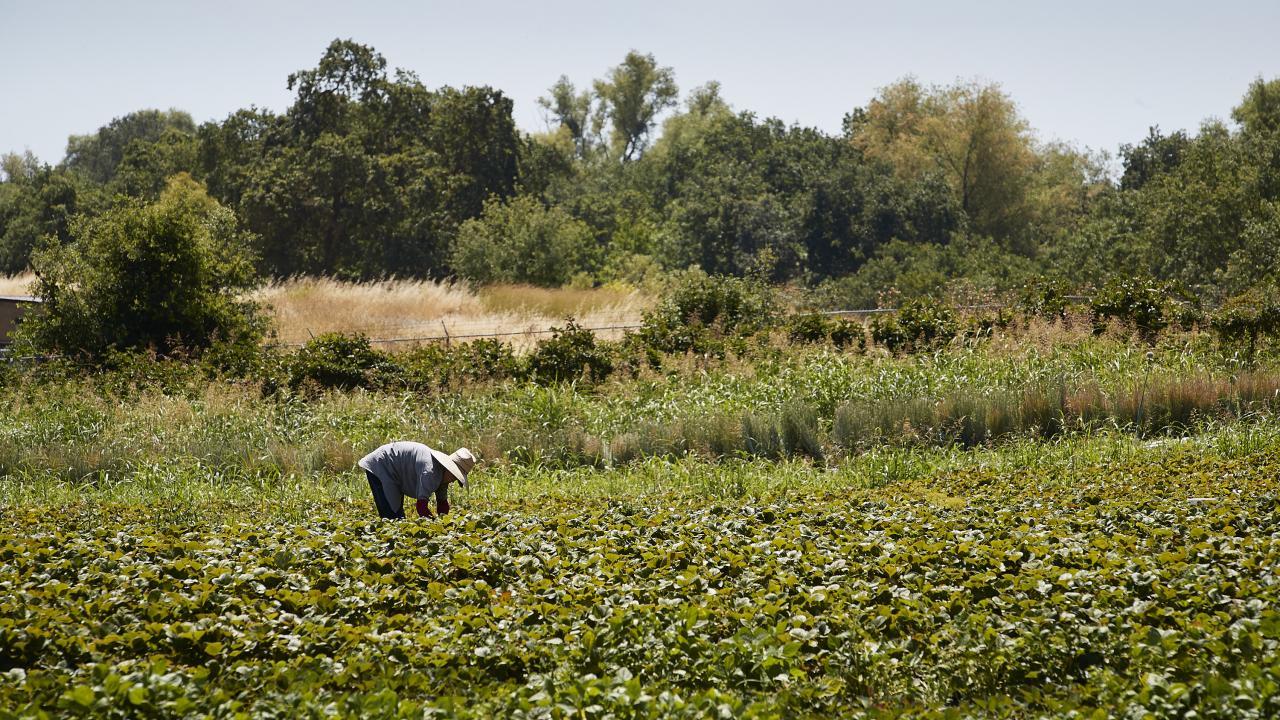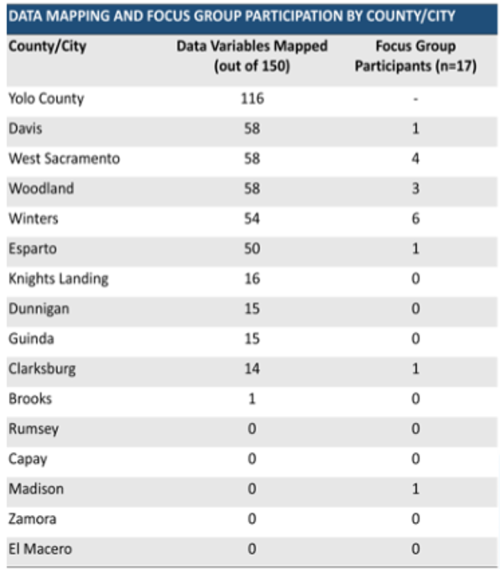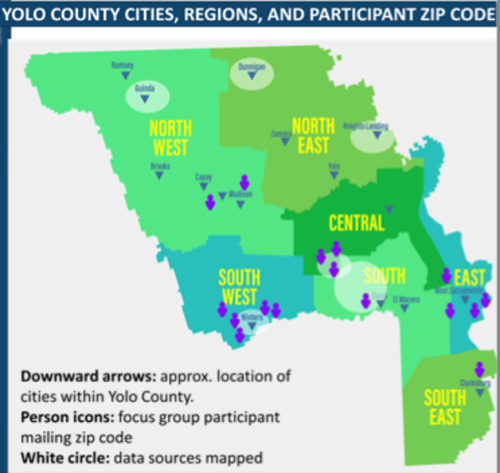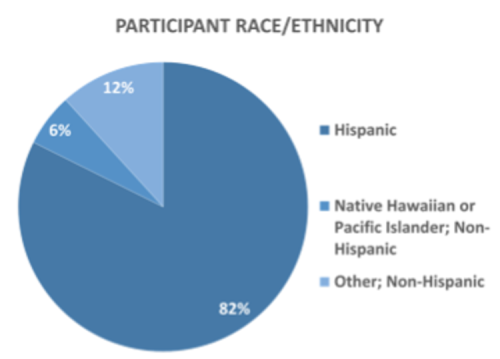
Engaged Research to Promote Health Equity
PIRI grant helps team of public scholars address gaps, build trust and determine how COVID-19 has impacted community and health priorities
As a biomedical engineer by training, the Resilient Yolo-Perinatal Origins of Disparities Center collaboration was my first foray into leading a community-engaged health disparities project. Our team envisioned this work pre-pandemic; however, when the shut-down occurred, we had to adapt our work to remote engagement and find ways to train undergraduate scholars on how to leverage online resources for research. We also used these tools to connect with and hear from members of Yolo County.
Our project, which we recently presented at the virtual Academy Health 2021 Health Datapalooza and National Health Policy Conference, had three primary goals:
- Obtain early community input on key priorities for future research,
- Learn how community members want the UC Davis Perinatal Origins of Disparities Center and Resilient Yolo (RY) to partner together to best address these priorities to promote health equity. (RY is a community coalition of local agencies focused on improving resiliency in Yolo County through building awareness of adverse childhood experiences.), and
- Once the pandemic emerged, determine how COVID-19 impacted community and health priorities.
Building trust is key

Establishing trust with members of the community is the key to being successful when it comes to this type of work. The PIRI grant gave us some of the funding to connect with community partners and stakeholders. Once we built a foundation of trust, we could then target our research efforts to ensure we were focusing on issues that aligned with current community needs.
This approach and the findings are particularly important for Yolo County. In this region, the disparities in health outcomes across local districts differ greatly by zip code and, in some instances, are below the state average despite close proximity to state lawmakers and agencies. For instance, pregnant people in Yolo County are twice as likely to be hospitalized for mental illness and 40% more likely to develop gestational diabetes compared to other pregnant people in California.
Identifying this need, our team took a multi-pronged approach to executing our work.
First, we started with the data. Our team identified common national, state, and local data sources for family and child health variables that could be mapped to identify gaps and needs across possible research areas. The data mapping documented 151 variables across more than 24 data sources to identify gaps in data. This mapping also included COVID-19 resources available in the local Yolo community.

Then we involved community stakeholders. Once the initial round of data mapping was complete, the team held focus groups with residents from Yolo County who are parents to at least one child 0-18 years of age. The focus group recruitment leveraged parenting group networks from RY partners and conducted public advertisement in community spaces frequented by parents and caretakers. Our goal was to obtain representation from all rural and urban communities within Yolo County.
Partnership creates community-endorsed benchmarks of success
This partnership was key because it allowed us to ask community members to share ideal benchmarks of progress or changes. We also asked them how community trust might be improved if local researchers and community partners prioritized or addressed these issues through partnership.

Our team also sought to identify how COVID-19 impacted the importance of these priorities. As you can see from figure 1 for data mapping and focus group participation by city within Yolo County, most of the cities within Yolo County had less than 30% of the mapped variables available. Figure 2 shows a map of where our participants live and where data were geographically mapped. Figure 3 shows the race/ethnicity of our focus group participants.
Key needs according to community input
The community also shared with us that it would like to see more activities and resources for teens/adolescents (physical activity, mental/emotional health, financial literacy, substance abuse education) and for seniors (bilingual and culturally competent activities), more affordable housing, and support for single income households. They would also like to see more affordable childcare, a community resource navigation hub (which we are working on as a follow up to this PIRI funded project), improved internet access, technology courses (for parents and seniors), child and adolescent development courses for parents, and divorce navigation assistance (legal and mental health challenges). The community would like to know more about adolescent mental health resources, program eligibility criteria for various programs (age, income, citizenship status, etc.), best parenting resources to help children across their lifespan, about water contamination and effects, how to identify domestic violence and differences across cultures related to domestic violence and the impact of nutrition on children.
Community-informed future research priorities
Community members shared with us that priorities of future research should include:
- discrimination, stress, anxiety,
- growth, motor skills,
- marijuana,
- debt,
- playgrounds,
- dioxin DDT (pesticides), arsenic, bisphenol A (BPA),
- generational/community support and
- contraceptives.
This input from the community demonstrated the wide variety of needs in Yolo County. We intend to follow up with our community members to both share with them research being done in the areas that they are interested in, and delve further into determining how they would like to see us approach these topics in our research.
We found that COVID-19 increased the importance of the community’s need for:
- adolescent support groups and resources,
- mental health education and support for parents and youth, particularly on understanding depression, anxiety and stress,
- training and increased access to technology
- health insurance access.
Engaged scholarship may inform policy
The results from this work have the potential to inform local and state policymakers on how community members value various child and family health issues.
This informed scholarship is powerful because it is based on rich descriptions of their personal experiences. This community-engaged research contextualizes the quantitative data on which policies are usually made.
We hope that our work will not only continue, but will also be replicated by other counties that may want to collaboratively address public health to promote equity.
The following individuals were key members of this team, including Sharon Tafolla, who ran focus groups and presented data, UC Davis students Indira D’Souza, Kirby Lee, Bianca Puente, and Alex Bui, who mapped all of the data, Lucy Roberts of Hui International, who supported these efforts in the community, and Dr. Leigh Ann Simmons, Co-Director of the POD Center and Director of the Health Equity Across the Lifespan Lab.
Learn more about their PIRI Grant Project
All blogs are the personal accounts and opinions of the individual writers and do not necessarily reflect the those of Public Scholarship and Engagement or UC Davis.
